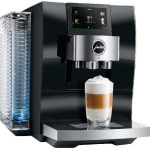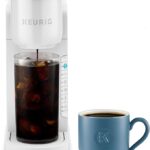Unlock the Full Flavor Potential: Why Water Quality Matters for Coffee Taste
Based on my experience training baristas and diving deep into the world of specialty coffee, I’ve come to realize that one often overlooked factor can make or break the taste of your brew: water quality. Many coffee enthusiasts focus solely on the beans, equipment, and brewing techniques, but the water you use plays a crucial role in unlocking the full flavor potential of your coffee.

The Clear Benefits of Using High-Quality Brewing Water
Using the right water filters and ensuring your coffee water has the perfect mineral content can have a profound impact on the taste and overall experience of your coffee. Here are some of the key benefits you can expect:
- Enhanced flavor clarity and balance
- Reduced bitterness and astringency
- Better extraction of desirable flavor compounds
- Improved longevity of coffee equipment
- Consistent taste across different brew methods
Real-World Examples and Scenarios
Let me share a personal experience that really drove this point home for me. I once visited a renowned coffee roaster who had meticulously dialed in their roast profiles and brewing techniques, but their coffee still tasted flat and lackluster. After some investigation, we discovered that the issue was the water they were using, which had a high mineral content and an alkaline pH. Once they installed a proper water filter and adjusted the mineral composition, the same coffee beans suddenly came alive with vibrant flavors and a balanced acidity.
Personal Experiences and Results
In my own home setup, I’ve experienced firsthand the difference that using high-quality brewing water can make. After installing a reverse osmosis system and adding the appropriate mineral salts, my espresso shots became sweeter, more nuanced, and had a velvety mouthfeel. The same applied to my pour-over brews, which exhibited a cleaner and more pronounced flavor profile.
Practical Applications and Tips
Improving your water quality doesn’t have to be complicated or expensive. Here are some practical tips you can implement right away:
- Invest in a high-quality water filter or reverse osmosis system designed for brewing coffee.
- Use bottled spring water or distilled water and add mineral salts to achieve the desired water chemistry.
- Test your water regularly and adjust the mineral content as needed.
- Clean and descale your coffee equipment regularly to prevent mineral buildup.
Comparison with Alternatives
While some may argue that using tap water or bottled drinking water is sufficient, the truth is that these sources can vary greatly in mineral content and pH levels, leading to inconsistent results. By taking control of your brewing water, you eliminate these variables and ensure a consistent, high-quality cup every time.
Recommendations and Next Steps
If you’re serious about taking your coffee game to the next level, I highly recommend investing in a quality water filter or reverse osmosis system designed for coffee brewing. Start by testing your current water source and researching the perfect mineral composition for your preferred brew methods. Once you’ve dialed in the perfect water chemistry, you’ll be amazed at the depth and complexity of flavors you can unlock in your coffee.
Don’t let subpar water quality hold you back from experiencing the true potential of your coffee beans. Embrace the power of high-quality brewing water, and prepare to embark on a flavor journey like never before.
Jura Espresso Machines are the most durable and efficient coffee machines, suitable for home and professional usage. Read our reviews of Jura E8, Jura Impressa Z6, Jura S8 and Jura Z10 that will help you in selecting the Jura that meets your requirements.








Comments are closed.